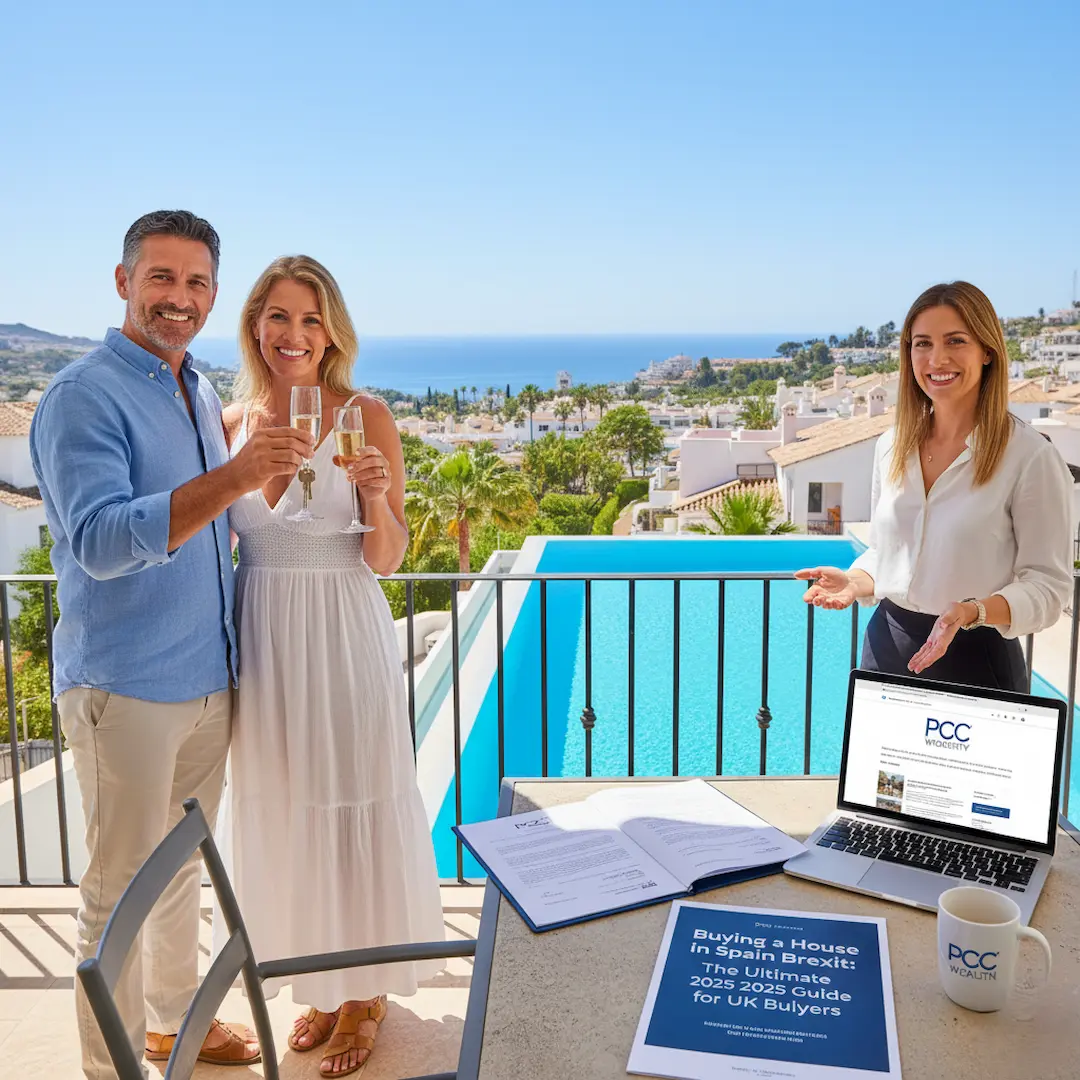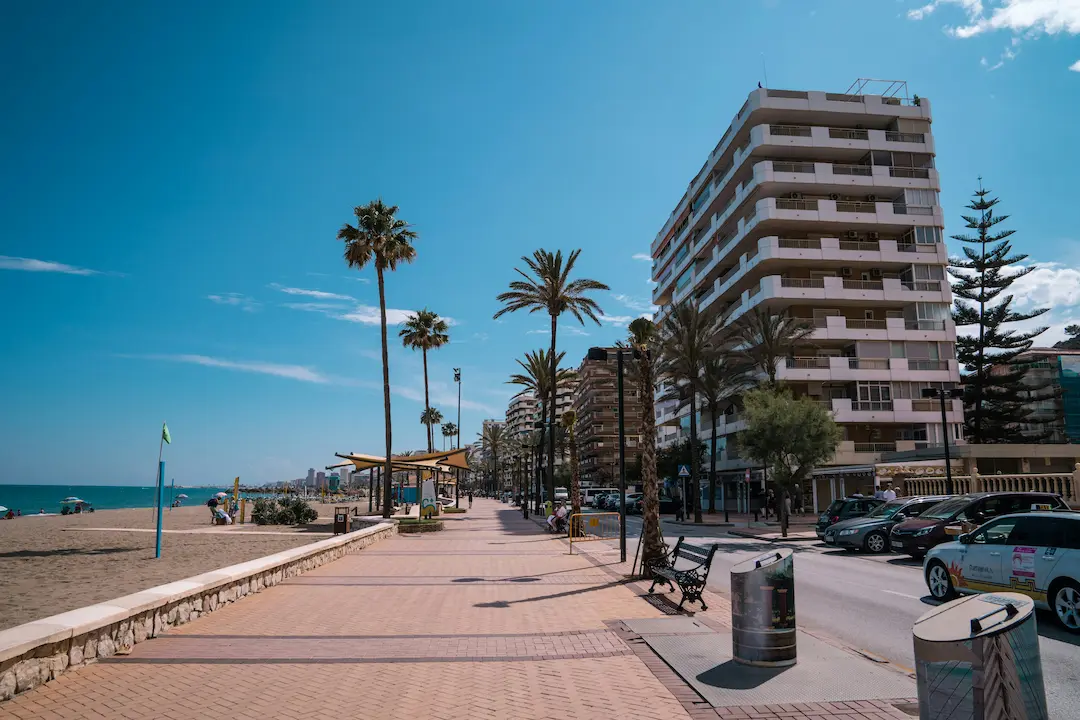The vision of a sun-drenched Spanish lifestyle hasn’t faded since Brexit; in fact, for many, the dream of owning a home in Spain is more alive than ever.
But since the UK’s departure from the EU, there are new rules and important considerations to understand. The path to purchase has changed, and navigating it requires clarity and expert guidance.
Whether you’re looking for a holiday retreat, a golden investment, or a full-time relocation, this guide is designed to cut through the confusion.
We’ll provide you with the expert knowledge needed to move forward with confidence, helping you to unlock the door to your new life in Spain.

The Post-Brexit Reality: We’ll confirm your right to buy property and clarify exactly what has changed for UK citizens.
Residency & Visas: An in-depth look at the 90/180-day rule and your main options for longer stays, including the Non-Lucrative, Golden, and Digital Nomad visas.
The Complete Financial Picture: A full breakdown of property taxes, purchase costs, and how to secure a Spanish mortgage.
A Step-by-Step Buying Guide: From getting your essential NIE number to completing at the notary.
Crucial Tax Implications: How Brexit affects Capital Gains, rental income, and inheritance tax for UK nationals.
Finding Your Dream Location: An overview of the most popular regions for British buyers.
Let’s start by addressing the most important question.
Yes, absolutely.
The dream of owning a home in Spain hasn’t disappeared for British buyers. Brexit does not restrict your right to buy property.
UK nationals continue to have the same legal rights as any other non-EU citizen when it comes to purchasing residential or commercial property in Spain.
The key shift is not in your right to buy, but in your right to use and stay in the property.
Since Brexit, UK citizens are now “third-country nationals,” which means the rules for residency and long-term stays are the main new hurdle to understand.
The sheer volume of headlines and hearsay surrounding Brexit can create a lot of confusion and anxiety for prospective buyers.
It’s easy to get tangled in worries about hidden costs, new restrictions, and complex rules. #
In this section, we’ll tackle these concerns head-on, separating the myths from the reality so you can proceed with clarity and confidence.
Myth | Reality |
“Buying property will cost me more in tax.” | The purchase taxes (ITP or VAT) are the same for everyone, regardless of nationality. The changes primarily affect taxes on future earnings or profits from the property. |
“It’s impossible to get a Spanish mortgage now.” | Spanish banks continue to offer mortgages to UK buyers, though the criteria are slightly different for non-residents. |
“I can’t rent my property out anymore.” | You absolutely can. However, the tax on rental income is now at a different rate for non-EU citizens. |
This is the most significant change post-Brexit. Understanding these rules is crucial if you plan to use your Spanish property for more than short holidays.
As a non-EU national, you can now spend up to 90 days in any 180-day period within the Schengen Zone (which includes Spain) without a visa.
It’s vital to understand that this is a rolling 180-day period. It’s not a simple case of 90 days in, 90 days out.
When you enter, the authorities can look back over the previous 180 days to see how long you have already spent in the zone.
Overstaying can lead to fines and difficulties re-entering in the future.
For longer stays, you’ll need a visa or residency permit. Here are the most popular routes for UK buyers:
"We always advise our clients to consider their long-term goals. The Golden Visa is a fantastic option for those making a significant investment as it provides the most freedom. However, the NLV is an excellent and accessible route for retirees. PCC Wealth, we can help you structure your finances to meet the requirements for your chosen visa, ensuring a smooth application."
Joanne Wilson - Head of PCC Property
One of the most important steps in buying a house in Spain after Brexit is understanding the full financial picture.
Beyond the property’s ticket price, you should budget for an additional 10-15% to cover the various taxes and fees.
These costs are a crucial part of the budget for any UK buyer purchasing property in Spain.
Transfer Tax (ITP) or VAT (IVA): For a resale property, you’ll pay ITP, a regional tax ranging from 7-10%. For a new-build property from a developer, you’ll pay 10% VAT (IVA) plus 1.2-1.5% Stamp Duty (AJD).
Notary and Land Registry Fees: These are fixed by law and typically amount to 1-2% of the purchase price.
Legal Fees: Using an independent lawyer (abogado) is essential. Expect to pay around 1% of the purchase price for their services, which include all due diligence.
Spanish banks continue to offer mortgages to non-EU citizens, though requirements may be stricter.
Typically, as a non-resident, you can borrow up to 60–70% of the property’s assessed value (whichever is lower than the purchase price).
The bank will require comprehensive proof of your income and outgoings from the UK (e.g., P60s, tax returns, employment contracts, and a UK credit report) to conduct affordability checks.
You can find out more about getting in mortgage in Spain as a non resident here.

Navigating the Spanish property system is straightforward with the right team.
"The Contrato de Arras is the most critical stage before completion. With the help of PCC Legal, we conduct exhaustive checks on the property's legal status, planning permissions, and any outstanding debts. Signing this contract without proper legal oversight is the single biggest risk a buyer can take. Our role is to eliminate that risk completely."
Joanne Wilson - Head of PCC Property
This is an area where Brexit has had a direct financial impact for UK nationals who sell or rent out their Spanish property.
The right location is key to living your dream.
The Costa del Sol remains a top choice thanks to its superb infrastructure, international schools, established expat communities, and year-round sunshine. Areas like Mijas Costa, Marbella, and Estepona are particularly popular for lifestyle-driven buyers.
However, regions like the Costa Blanca (with hotspots like Jávea and Moraira) and the Balearic Islands of Mallorca and Ibiza continue to attract significant interest from British buyers seeking everything from vibrant coastal towns to tranquil rural retreats.
Here are answers to some of the most common questions we receive from UK buyers.
How much deposit do I need as a UK buyer?
As a non-resident buyer seeking a Spanish mortgage, you will typically need a larger deposit than a resident.
Banks will usually lend 60-70% of the property value, meaning you should budget for a deposit of at least 30-40% of the purchase price, plus the additional 10-15% needed to cover taxes and fees.
Do I need a Spanish bank account to buy a property?
Yes, this is essential.
You will need a Spanish bank account to pay the property purchase taxes, utility bills, and community fees.
It’s one of the first things you should set up, along with your NIE number.
Can I use my UK-based solicitor for the purchase?
It’s strongly advised that you use a qualified, independent Spanish lawyer who is registered with the local bar association.
They specialise in Spanish property law and will understand the specific regional regulations and due diligence required to protect your investment.
Using a non-specialist can be a significant risk.
What happens if I want to sell my Spanish property in the future?
You are free to sell your property at any time.
The key difference post-Brexit is how the profit is taxed.
As a UK resident, any profit (capital gain) from the sale will be taxed at the non-EU rate of 19%.
It’s important to factor this into your long-term financial planning.
Is my UK will valid for my Spanish property?
A UK will can be recognised in Spain, but the process of executing it can be slow and costly.
It is highly recommended that you create a separate Spanish will to deal specifically with your Spanish assets.
This simplifies the inheritance process immensely for your beneficiaries and can be arranged easily with a Spanish lawyer.
Can my family get residency if I buy a property through the Golden Visa scheme?
No, the Spain Golden Visa program is no longer available.
The Spanish government officially repealed the Golden Visa scheme, which allowed non-EU nationals to obtain a residence permit through significant investments like real estate, on April 3, 2025.
This decision was driven by concerns over the housing crisis, and as a result, investors can no longer obtain a Spanish residence permit by investing in real estate.

The dream of owning a home in Spain is very much alive for British buyers.
The rules have changed, but the path is clear for those who are well-informed and well-advised.
The key is to prepare properly, understand the new residency and tax landscape, and build a team of trusted professionals.
At PCC Property, we don’t just find you the right home.
Through our integrated PCC Legal, PCC Wealth, and PCC Insurance services, we help UK buyers navigate every cross-border detail.
We work alongside you to ensure the entire process is seamless, secure, and successful.
Ready to unlock your new life in Spain?
Contact our expert team today to begin your journey.
Check out our detailed area guides along the Costa del Sol and Algarve.
Keep up to date with property news along the Costa del Sol with our blogs.
At PCC Property we don’t just list properties, we unlock lifestyle dreams, Discover how our sales-only, lifestyle-first approach is different.
Who we are
Discover more on our commitment to transparency, trustworthy advice and delivering exceptional client service.